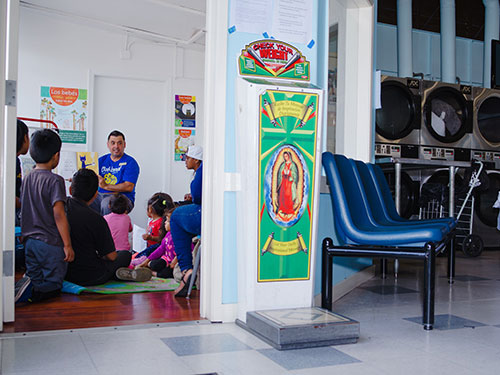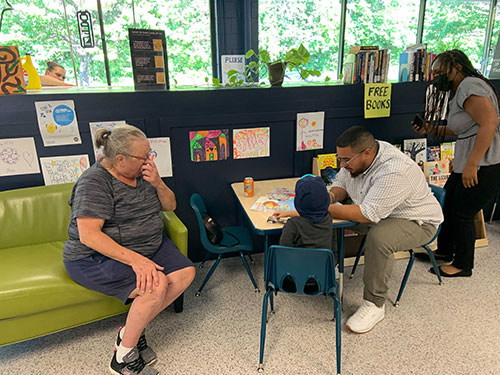Grant Spotlight | June 22, 2022
Share ThisJune 22, 2022

“My favorite part of the project was learning new skills and getting the opportunity to work directly with our partners in the field to create a resource that directly responds to their needs and reflects their insight. It’s been an incredibly rewarding experience!”
— Katherine Trujillo, Deputy Director/Director of Education at Libraries Without Borders US
What do public libraries and coin laundromats have in common? Through a partnership called the Wash and Learn Initiative (WALI), Libraries Without Borders US offers early childhood literacy, digital literacy, and information access services inside laundromats. And thanks to a grant from the Institute of Museum and Library Services, they conducted a 2-year project to refine and assess the WALI partnership model and make it accessible to library systems across the country.
WALI brings together public libraries, laundromats, nonprofits, and community-based organizations nationwide to create access points for library services inside local laundromats. Drawing on previous work in eight states, the project team refined their existing model and tools and continued to scale and evaluate WALI with the Enoch Pratt Free Library (in Baltimore, Maryland), Allegheny County Library Association (Pennsylvania), and the Minnesota State Library Services.
Connecting Communities Across the Country

To ensure library systems had what they needed to implement WALI, Libraries Without Borders US developed and distributed a toolkit including case studies, webinars, and logistical materials.
Deputy Director/Director of Education at Libraries Without Borders US Katherine Trujillo had the primary responsibility of putting together the Wash and Learn Community Toolkit for library systems and nonprofit organizations interested in bringing this program to their communities.
“I worked with Libraries Without Borders US staff and project stakeholders to develop a practical, step-by-step guide on how to transform a neighborhood laundromat into a pop-up library and learning space,” Trujillo said. “Through an iterative and incremental design process known as agile, we curated relevant information and created adaptable resources to support the widespread adoption of the WALI model.”
By working with an advisory committee comprised of librarians, nonprofit partners, laundromat owners and staff, and other community stakeholders, Trujillo and her team were able to leverage their varied expertise to identify topics for the toolkit, create content, review materials, and develop case studies directly from user interviews.
Post-Pandemic Planning

As was the case for so many community-based, in-person programs in recent years, the Libraries Without Borders US project team was presented with a big challenge while trying to complete this work in the midst of a global pandemic.
“It was incredibly difficult to maintain any sense of momentum in 2020 when there was so much uncertainty about the future. For example, early on in the pandemic, many of our WALI sites closed their doors indefinitely as the entire world went into lockdown,” Trujillo said. “At the same time, several library partners had to furlough staff who had been critical to running projects at the local level. As people’s lives and priorities shifted, we even struggled to convene our advisory committee.”
But as the public health situation improved, the project team was able to resume programming and continue working on the toolkit. Over the next few months, they plan to get the word out about the toolkit and collaborate with new library systems and laundromats to connect the WALI model to more communities across the country.
About the Project
Grant Project Name: Wash and Learn Initiative (WALI)
Grant Log Number: LG-17-19-0119-19
Year Awarded: 2019
Recipient: Libraries Without Borders US
Project Contact:
Katherine Trujillo
Deputy Director/Director of Education
Libraries Without Borders US
kat@librarieswithoutborders.us
